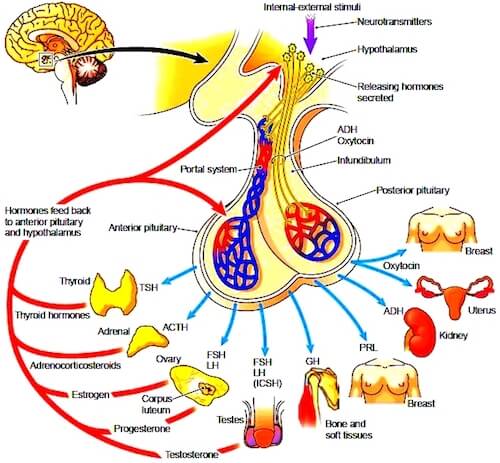One of the laughable aspects of modern so-called “science” is when some science-trained twit makes a pronouncement—which is nothing more than an opinion—and then this is passed off as actual science.
Case in point: the place of oxytocin in interpersonal reactions. Who doesn’t know this is the “love hormone” or the “cuddle chemical”? Yet seriously ignorant Professor Mike Ludwig at Edinburgh University, UK, says it’s all “hype”.1
Professor or not, Ludwig seems not to have read about the actual functions of oxytocin. He’s fussing about the fact that no-one has replicated the 2005 study which showed that sniffing oxytocin spray increased generosity, cooperation and trust has never been replicated (only because no-one has tried, dolt, not that all attempts have failed!)
The fact is that the role of oxytocin can reduce anxiety, create calm, trust and inward peace. Moreover, low oxytocin levels have been definitely identified in autism, ADHD, depression, anxiety, addictions (including gambling) and schizophrenia.
Moreover, Ludwig complains that it has not been shown that oxytocin can cross the blood-brain barrier. Well, it has actually, in a 2013 paper from Germany.2 But not to a standard that a nit-picky, very prejudiced and pretty ignorant professor would demand, especially one that rates his own opinions over the facts-so-far.
Hormone Health and Mood
So, having got the rant over, I might as well turn my attention to the role of hormones in mood and thinking. PMS is a great example. Most men have had the experience of being ready to break up with a woman, till he/she realized that it was a certain time of the month!
I have joked for decades that “Many men suffer from PMS!”
Prickly comedienne Roseanne Barr similarly joked: “Women complain about PMS, but I think of it as the only time of the month when I can be myself.”
I don’t think anyone is in any doubt of the effect. In 1892 Lizzie Borden was famously acquitted of murdering her father and stepmother with an axe, on the grounds she was psychotic with PMS.
 Lizzie Borden took an axe, and gave her mother forty whacks.
Lizzie Borden took an axe, and gave her mother forty whacks.
When she saw what she had done, she gave her father forty-one.
(children’s rhyme)
But which hormones are to blame? It’s not easy to figure out, since women’s hormone levels change constantly and every woman is slightly unique.
Estradiol, undoubtedly, and progesterone seem to be the two main offenders. Bad moods may relate more to a sudden drop in estrogen levels—or maybe to excessively high levels just before the menses.
High progesterone levels have been linked to increased activity in the amygdala; which are part of the limbic system within the brain, responsible for emotions, survival instincts, and memory. It is involved in the processing of emotions such as fear, anger, and pleasure.
Are You Hangry?
A lot of women get hungry and angry, not realizing they are inexorably linked in the hormone called ghrelin. It creates the feeling of hunger. But it also causes intermittent explosive disorder by upregulating the “anger peptide” NPY.
In what the Americans call a double whammy, NPY peptide actually competes with serotonin, the so-called “happy hormone” (not quite that simple but we all know that serotonin contributes greatly to peace of mind and pleasure).
So being an antagonist of serotonin is bad news. Serotonin calms the amygdala and pre-frontal cortex, which allow us to experience our emotions moderately, instead of in a storm.
So hypoglycemia isn’t the only reason for emotional outbursts when hungry: it could be hormonal too.
Myths About Testosterone
It’s supposed to make men aggressive and violent. But that’s not entirely true. A study published in 2016 found that high-testosterone men responded according to social norms. They were more likely to punish someone who had treated them unfairly. But were equally likely to be generous in sport, if their opponent was also generous.
What matters is that when testosterone is missing in an aging man, this causes low energy, depression, a lack of sex drive, and erectile dysfunction. You replace testosterone in appropriate doses and all of that normalizes. The reason for that is that many key organs, including the brain, have testosterone receptors. They need to be activated regularly by testosterone for normal organ function.
Women need a small amount of testosterone as well to feel normal and to maintain their libido.
Alcohol, unfortunately, diminishes testosterone on the blood; perhaps another scientific angle on Shakespeare’s famous quote, that alcohol “promotes the desire but takes away the performance”! (Macbeth, the porter, speaking in act 2 scene 3)
Adrenal Exhaustion & Hormone Health
A rather corny journal I am reading (or I should say the underperforming writer and a lazy editor) says that adrenal fatigue is merely a “nugget of internet wisdom” that “is easy to diagnose online but neither doctors nor scientists recognize such a condition”.
This dismissive generalization makes liars out of careful doctors who recognize the condition as real and important enough to treat. Doctors who don’t know adrenal insufficiency are dangerously ignorant.
These are the published symptoms of adrenal insufficiency, taken from the government National Institute of Diabetes and Digestive and Kidney Disease (NIDDK) website:
- chronic, or long lasting, fatigue
- muscle weakness
- loss of appetite
- weight loss
- abdominal pain
- nausea
- vomiting
- diarrhea
- low blood pressure that drops further when a person stands up, causing dizziness or fainting
- irritability and depression
- craving salty foods
- hypoglycemia, or low blood sugar
- headache
- sweating
- irregular or absent menstrual periods
- in women, loss of interest in sex
A number of these, as you see, are emotional in nature.3
Can Stress Hormones Be Protective?
An intriguing possibility is being debated: higher levels of estrogen in women and testosterone on men may have protective effects against PTSD (post-traumatic stress disorder). For example, women who had been raped but took an emergency contraceptive afterwards seemed to have less likelihood of developing PTSD than those who took no abortive estrogen.
And studies of men with high testosterone and cortisol levels before battle were found to be less likely to develop battlefield PTSD.
These findings suggest the administration of hormones immediately after a stressful event could lower the incidence of PTSD developing.
And, you will have noticed, further point up the real nature of adrenal insufficiency and how dangerous it is.
All Act Together
It is important in reading this review to understand that all hormones are interactive. It would be very rare to get significant changes in one and not have it affect the others.
All endocrine glands (the ones without ducts that secrete hormones directly into the blood) are controlled by the pituitary gland, which in turn is subject to rule from the hypothalamus, which is dominated by our thoughts and emotions. The hypothalamic pituitary pathway has profound influences on our hormonal and emotional state.
 Key: GH growth hormone, FSH follicle stimulating hormone, LH luteinizing hormone, PRL prolactin, TSH thyroid stimulating hormone, ADH antidiuretic hormone.
Key: GH growth hormone, FSH follicle stimulating hormone, LH luteinizing hormone, PRL prolactin, TSH thyroid stimulating hormone, ADH antidiuretic hormone.
Enjoy the lesson? You’ll let me know if it wasn’t useful, I’m sure.
To your emotional and hormone health!
References:
- Intranasal Oxytocin Mechanisms Can Be Better Understood, but Its Effects on Social Cognition and Behavior Are Not to Be Sniffed At. / Leng, Gareth; Ludwig, Mike. In: Biological Psychiatry, 15.04.2016
- Striepens N, Kendrick KM, Hanking V, Landgraf R, Wüllner U, Maier W, & Hurlemann R (2013). Elevated cerebrospinal fluid and blood concentrations of oxytocin following its intranasal administration in humans. Scientific reports, 3 PMID: 24310737
- https://www.niddk.nih.gov/health-information/endocrine-diseases/adrenal-insufficiency-addisons-disease
